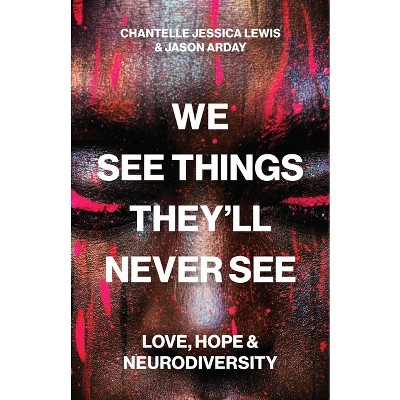Sponsored

Where Paralytics Walk and the Blind See - by Mary Dunn (Hardcover)
$32.00Save $2.00 (6% off)
In Stock
Eligible for registries and wish lists
Sponsored
About this item
Highlights
- An exploration of early modern accounts of sickness and disability--and what they tell us about our own approach to bodily difference In our age of biomedicine, society often treats sickness and disability as problems in need of solution.
- About the Author: Mary Dunn is associate professor of early modern Christianity at Saint Louis University.
- 224 Pages
- Social Science, Sociology of Religion
Description
About the Book
"In an age of modern biomedicine and global pandemic, we are strongly inclined to consider illness and disability as problems in need of scientific solutions. History informs us, however, that bodily and mental illness and disabilities have been understood in myriad ways across time and space. This book introduces readers to an alternative understanding of such matters formed in the Christian-Catholic culture of early modern French Canada. In a society that subscribed uniformly to a Christian view of salvation, sickness and disability were always more than physical problems in need of resolution-these were phenomena freighted with moral and spiritual significance. They were occasions for the demonstration of virtue, an invitation to charity, a medium of redemption, and/or an opportunity for conversion. Dunn takes us on a tour of early modern French Canadian understandings of sickness and disability through a close examination of four distinct historical sources: recorded stories told by Jesuits in New France, in particular accounts of sickness and (occasional) healing of Indigenous peoples; stories of sickness crafted in an institutional history of Canada's first hospital, published in 1751; representations of disability in a late seventeenth-century hagiographic description of a venerated, self-sacrificing nun and hospital leader; and a dossier compiled in the early eighteenth century in support of the canonization of a Franciscan Friar. Considering these sources alongside each other, and alongside her own experience as the mother of a child with a disability, the author aims not to recuperate these early modern understandings-which she readily acknowledges were accompanied by cruelty, intolerance, and racism-but rather to explore how and why they made sense in their time and place. In doing so, she opens up a space of critical distance between ourselves and our own deeply internalized views of sickness and disability, and offers a challenge to extant norms of historiography that avoids the personal and the possibility that the present and the past inform each other"--Book Synopsis
An exploration of early modern accounts of sickness and disability--and what they tell us about our own approach to bodily difference
In our age of biomedicine, society often treats sickness and disability as problems in need of solution. Phenomena of embodied difference, however, have not always been seen in terms of lack and loss. Where Paralytics Walk and the Blind See explores the case of early modern Catholic Canada under French rule and shows it to be a period rich with alternative understandings of infirmity, disease, and death. Counternarratives to our contemporary assumptions, these early modern stories invite us to creatively imagine ways of living meaningfully with embodied difference today. At the heart of Dunn's account are a range of historical sources: Jesuit stories of illness in New France, an account of Canada's first hospital, the hagiographic vita of Catherine de Saint-Augustin, and tales of miraculous healings wrought by a dead Franciscan friar. In an early modern world that subscribed to a Christian view of salvation, both sickness and disability held significance for more than the body, opening opportunities for virtue, charity, and even redemption. Dunn demonstrates that when these reflections collide with modern thinking, the effect is a certain kind of freedom to reimagine what sickness and disability might mean to us. Reminding us that the meanings we make of embodied difference are historically conditioned, Where Paralytics Walk and the Blind See makes a forceful case for the role of history in broadening our imagination.Review Quotes
"Winner of the Award for Excellence in Historical Studies, American Academy of Religion"
"Winner of the Catholic Media Book Award, History Category"
"An excellent demonstration of what is possible when one marshals the skills of a historian of religion to 'make room for the creative apperception of sickness and disability beyond the measure of the norm'."---Mark Brians, Reading Religion
About the Author
Mary Dunn is associate professor of early modern Christianity at Saint Louis University. Her books include The Cruelest of All Mothers and Religious Intimacies.Dimensions (Overall): 8.5 Inches (H) x 5.51 Inches (W) x 1.02 Inches (D)
Weight: .95 Pounds
Suggested Age: 22 Years and Up
Sub-Genre: Sociology of Religion
Genre: Social Science
Number of Pages: 224
Publisher: Princeton University Press
Format: Hardcover
Author: Mary Dunn
Language: English
Street Date: June 21, 2022
TCIN: 93288318
UPC: 9780691233222
Item Number (DPCI): 247-38-6710
Origin: Made in the USA or Imported
If the item details aren’t accurate or complete, we want to know about it.
Shipping details
Estimated ship dimensions: 1.02 inches length x 5.51 inches width x 8.5 inches height
Estimated ship weight: 0.95 pounds
We regret that this item cannot be shipped to PO Boxes.
This item cannot be shipped to the following locations: American Samoa (see also separate entry under AS), Guam (see also separate entry under GU), Northern Mariana Islands, Puerto Rico (see also separate entry under PR), United States Minor Outlying Islands, Virgin Islands, U.S., APO/FPO
Return details
This item can be returned to any Target store or Target.com.
This item must be returned within 90 days of the date it was purchased in store, shipped, delivered by a Shipt shopper, or made ready for pickup.
See the return policy for complete information.
Frequently bought together

Highly rated
$19.02
was $22.38 New lower price
Buy 1, get 1 50% off select books
4.5 out of 5 stars with 15 ratings

$18.88
MSRP $27.00
Buy 1, get 1 50% off select books
4.8 out of 5 stars with 575 ratings

$15.68
Buy 1, get 1 50% off select books
4.8 out of 5 stars with 204 ratings
Trending Non-Fiction

$15.68
Buy 1, get 1 50% off select books
4.8 out of 5 stars with 204 ratings

Highly rated
$19.31
was $20.98 New lower price
Buy 1, get 1 50% off select books
4 out of 5 stars with 65 ratings

$18.28
was $19.58 New lower price
Buy 1, get 1 50% off select books
4.7 out of 5 stars with 17 ratings

$4.59
MSRP $7.99
Buy 1, get 1 50% off select books
4.8 out of 5 stars with 123 ratings

$6.20
MSRP $10.95
Buy 1, get 1 50% off select books
4.8 out of 5 stars with 33 ratings

$7.09
MSRP $9.99
Buy 1, get 1 50% off select books
4.9 out of 5 stars with 46 ratings
Discover more options

$10.99
MSRP $13.99
Buy 1, get 1 50% off select books
5 out of 5 stars with 1 ratings







